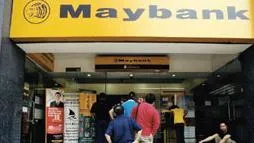
Maybank market share to double if RHB merger goes ahead
With the Malaysian government being the biggest shareholder in both banks, this one should be a no brainer.
Government-related entities will become the largest shareholder, owning 61% of Maybank, 42% of CIMBG and 48% of RHB Capital.
Malayan Banking Berhad and CIMB Group Holding Berhad announced plans to start separate merger talks with RHB Capital Berhad in a bid to become one of Southeast Asia’s largest banking groups. If either transaction goes through, regardless of which one wins, it would benefit the target company immediately and the acquirer in the long term.
Maybank, with a 23% market share by assets, is Malaysia’s largest bank. CIMBG owns CIMB Bank, which has a 14% market share and is Malaysia’s third-largest bank. RHB Capital owns RHB Bank, which has an 8% market share and is the country’s fifth-largest bank.
All the three banks have similar customer profiles. Around 60% of their loan customers are individuals, and small and midsize enterprises. The balance comprises large corporations, government units, financial institutions and foreign entities.
The transaction would most benefit RHB Bank’s credit profile and do so immediately as it would be merged into a stronger, bigger banking group. Moreover, the merger would resolve the unstable ownership structure negatively affecting RHB Bank’s long-term strategic planning since 2007.
The acquirer would benefit in the next two to five years because a merger would create a significantly larger bank with a leading market position, a larger customer pool and better economic scale. Moreover, the combined bank would have greater systemic importance, implying very strong systemic support in time of need.
The bank ratings shown in this article are the bank’s foreign currency deposit rating, its standalone bank financial strength rating mapped to the long-term scale, and the corresponding outlooks. Maybank’s local currency deposit rating is A1.
The Employees Provident Fund took control of RHB Capital from Utama Banking Group in 2007. It sold a 25% stake to Abu Dhabi Commercial Bank in 2008. ADCB is divesting the 25% stake. EPF currently owns a 48% stake in RHB Capital.
However, the acquirer would experience profit pressures in the first two years owing to integration costs as the new entity harmonizes systems and infrastructure, relocates overlapping branches and restructures certain operations. The acquirer may also face several quarters of asset-quality challenges without bigger-than-usual write-offs: RHB Bank has a higher non-performing-loan ratio of 4.10% at the end of March 2011 than Maybank's 3.67% and CIMB's 3.89%.
Ultimately, the capital structure and valuation of the transaction will drive the extent to which the transaction is credit positive for the acquirer. If the acquirer finances the deal largely with share swaps or new equity, and pays a price resulting in a moderate amount of goodwill, its capital positions would likely weaken only moderately. At the end of March, Maybank’s Tier 1 capital ratio was 11.6% and CIMB Bank’s 13.4%.
Other Malaysian banks would benefit immediately since the two banks involved in the merger would focus more on their integration and less on gaining business. They would also benefit in the long term if sector consolidation reduces competition. Such consolidation is in line with the Malaysian government’s plan to create regional banking champions and support national banking consolidation.
Both Maybank and CIMBG have the approval of the central bank to negotiate with RHB Capital on the deal until 31 August.




![Lorem Ipsum [ABF 1]](https://cmg-qa.s3.ap-southeast-1.amazonaws.com/s3fs-public/styles/exclusive_featured_article/public/2025-03/a_hand_pointing_to_a_futuristic_technology_5b87c9d0e3_1.png.webp?itok=2w0y1WhS)


![Cross Domain [Manu + SBR + ABF + ABR + FMCG + HBR + ]](https://cmg-qa.s3.ap-southeast-1.amazonaws.com/s3fs-public/styles/exclusive_featured_article/public/2025-01/earth-3537401_1920_4.jpg.webp?itok=WaRpTJwE)







 Advertise
Advertise

